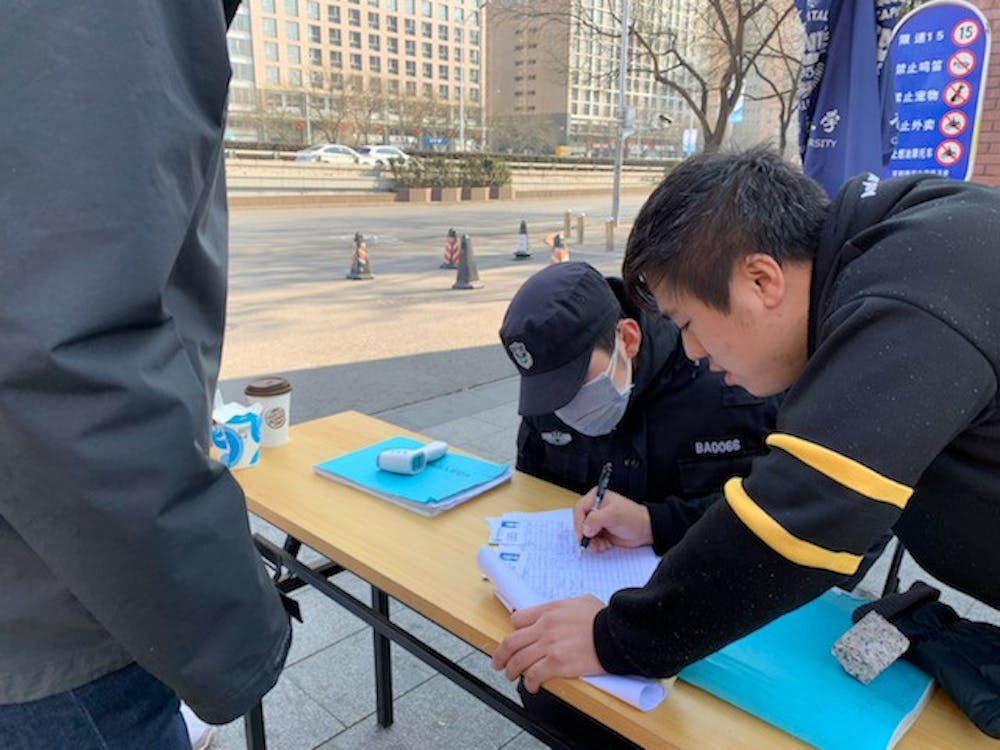UPDATE — Tuesday, Feb. 4
Students returning from China will not be allowed to return to the Middlebury campus until 14 days after their departure to prevent any possible spread of coronavirus.
Following the suspension of Middlebury School in China, 11 students who had already arrived in China had to evacuate the country. The last program students evacuated China on Saturday and thus will not be allowed to return to campus until Feb. 15, five days after the start of classes on Feb. 10.
Middlebury made this decision in line with Center for Disease Control guidelines, which ask that travelers coming from China limit contact with others and submit to monitoring by health officials during the two-week period after their departure.
“You won’t be penalized for missing classes, since this isn’t your choice, but rather is something that the college is asking of you,” wrote Assistant Director of International Programs Bill Mayers in an email to returning students.
Sabian Edouard ’21 and Edgar León ’21 had already returned to campus when Middlebury made the decision to quarantine returning students. Two days after their arrival on campus, the two received an email requesting that they report to Parton Health Center immediately.
Director of Health Services Dr. Mark Peluso informed the students that their risk of infection was low because they had left China quickly and because their study abroad location was not near the epicenter of the outbreak.
Edouard and León elected to remain on campus for this period and will be quarantined in a house on campus. They chose not to return home due to concerns about potentially contaminating their loved ones.
“Back in Beijing, my study abroad site, my friends and I were heavily encouraged to stay indoors as much as possible during the outbreak, so this is nothing new,” Edouard said. While he is disappointed that he is unable to continue his study abroad experience in China, Edouard feels lucky.
He acknowledges the many who are suffering from the novel coronavirus and those in the immediate outbreak zone in Hubei Province. “We are privileged to be back home safe and sound,” he said.
Edouard and León are good friends, so he predicts that the two weeks in quarantine will not be too unpleasant.
“Besides, now I can start watching that Game of Thrones series everyone was raving about,” Edouard said.
__
Friday, Jan. 31
The three Middlebury C.V. Starr Schools Abroad in China will not run this spring due to concerns over the coronavirus, the college announced in a campus-wide email this Tuesday. The college advised students who were planning to study in Hangzhou, Kunming and Beijing beginning this February to re-enroll in their home universities this spring. Non-Middlebury students whose home institutions have begun spring classes have been offered the chance to attend Middlebury for the semester — an estimated seven or eight out of the 37.
The World Health Organization declared the coronavirus a “public health emergency of international concern” on Jan 30. As of this morning, the World Health Organization confirmed 9,720 cases and 213 deaths in China, and that the disease had spread to 19 other countries. Today, the US State Department raised the China travel advisory to “Level 4 - Do Not Travel”, their highest rating. Only 13 other countries share this classification.
“There is too much at stake to risk any course of action other than suspending the program,” wrote Bill Mayers, assistant director of international programs, in an email to students enrolled in the Middlebury School in China for the spring semester and their parents. “We are considering both the potential health and safety risks, as well as the consequences for your academic progress,”
Program participants, hailing from 15 different universities, were set to arrive in China on Feb. 12. Eleven students, however, had already arrived when news of the cancellation hit — two of whom were planning to study there for the entire year and eight of whom arrived on Dec. 27 for a winter term course with CET Academic programs in Beijing.
Students began evacuating on Jan. 28, and the last student is scheduled to leave China at 6:30 p.m. local time on Feb. 1, according to Benjy Renton ’21, a Campus editor and one of the Middlebury students evacuating the country.
Capital Normal University, the location of the Winter Term class, is closed to all non-university personnel, including CET Beijing's resident director. In the interim, Renton is helping coordinate student departures and repatriation efforts. Middlebury will screen students upon their arrival on campus.
With several major airlines suspending or considering suspending flights to and from China, as well as President Trump’s administration instituting a partial travel ban, the Office of International Programs was worried that students might become stranded in the country.
“We don’t want them to be getting stuck there. We don’t know how Chinese authorities are going to react, if they are going to be clamping down more. We have no control over that, and that’s the part where we are a little more concerned,” Mayers told The Campus.
“When to make a decision and what we should decide to do are unbelievably challenging, given that the whole situation was changing so quickly,” said Zhang Kai, director of the Middlebury school in China in Beijing.
In addition to health and safety concerns, logistical challenges played a large part in informing the Office of International Programs’s decision, according to Mayers.
“We do this program hoping that students are going to have an immersive experience, but, frankly, they’re restricting gatherings of any size,” Mayers said. “You can’t go out and gather with other Chinese students. You can’t go to the movie theater, you can’t go to the club, you can’t do anything that Chinese people do in China. What are you going to do? Just stay in your dorm room the whole time? It’s not an immersive experience.”[pullquote speaker="Bill Mayers" photo="" align="center" background="on" border="all" shadow="on"]You can’t go out and gather with other Chinese students. You can’t go to the movie theater, you can’t go to the club, you can’t do anything that Chinese people do in China. What are you going to do? Just stay in your dorm room the whole time? It’s not an immersive experience.[/pullquote]
Schools and universities are indefinitely suspended across the country, with municipalities deciding when to reopen campuses. The Chinese government has imposed wide-scale travel restrictions — and many train lines have closed across the country and many of the top tourist attractions have closed indefinitely, according to Renton.
“At Capital Normal University, security guards are becoming increasingly more strict with entering and exiting. Each exit requires the guard to call our Resident Director to seek her approval,” he wrote in a post on his blog.
The cancelation poses academic concerns to many students. Some majors require a semester abroad. The Office of International Programs plans to run the program in China next fall, and will offer spots to the students who were unable to study abroad this spring. Students who have fulfilled the relevant language and course requirements were also offered the opportunity to study at other Middlebury schools abroad, such as those in Latin America.
“We feel horrible about [canceling the semester]. We know a lot of students come to Middlebury because they’re planning on studying abroad and we’ve got good programs,” Mayers said. “They’ve been waiting for two and a half years and we pulled the rug out from under them .... We feel that it’s the right decision, but it’s not a good one.”

China has become one of only 14 countries with a US State Department “Level 4 - Do Not Travel” travel advisory, the department’s highest rating.
The Office of International Programs sent an email to the faculty encouraging professors to be understanding and flexible in their class sizes to aid registration for incoming students.
Mayers confirmed that the college has found housing for all 37 students, should they choose to come to Middlebury. Non-Middlebury students must make the decision to enroll in the spring by Feb. 3.
“We do hope that you will help us in every way you can to make them feel welcome,” wrote Vélez in his initial campus-wide email, “Whether they are Middlebury students to begin with or if they come to us from other institutions, they will be Middlebury students for the time they are here.”
Editor’s note: Middlebury Campus editor Benjy Renton ’21 has been independently reporting from China on his blog, “Off the Silk Road.” Read his posts here.

Sophia McDermott-Hughes ’23.5 (they/them) is an editor at large.
They previously served as a news editor and senior news writer.
McDermott-Hughes is a joint Arabic and anthropology and Arabic major.
Over the summer, they worked as a general assignment reporter at Morocco World News, the main English-language paper in Morocco.
In the summer of 2021 they reported for statewide digital newspaper VTDigger, focusing on issues relating to migrant workers and immigration.
In 2018 and 2019, McDermott-Hughes worked as a reporter on the Since Parkland Project, a partnership with the Trace and the Miami Herald, which chronicled the lives of the more than 1,200 children killed by gun violence in the United States in the year since the Marjory Stoneman Douglas High School shooting in Florida.




